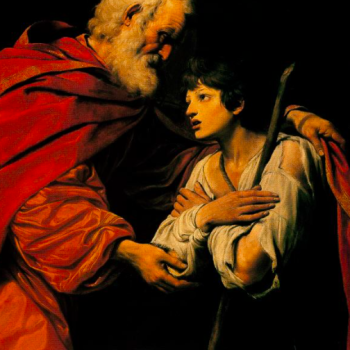
Oh come, all ye faithful, joyful and triumphant! Oh come ye, Oh come ye, to Bethlehem. Come and behold him, Born the King of angels; O come, let us adore him, Christ the Lord.
This popular Christian hymn has been translated into 52 languages and published in 710 hymnals worldwide. Many Christian congregations begin or conclude their Christmas services by singing it. Singing, hearing, or thinking of this song, whether you visualize shepherds trooping to Bethlehem or a congregation singing with all their hearts at a worship service, the message is the same: all the faithful are to come and adore the Savior.
"Come All Ye Faithful"
The invitation to “come, all ye faithful . . . to Bethlehem” places the singer both among the shepherds who rushed to see the Christ child, and in the long procession of the “faithful” that have journeyed to Bethlehem in their hearts for over 2,000 years.
This message by C. Michael Hawn, an authority on sacred music, places these words in our personal context. Shepherds tending their sheep in fields outside Bethlehem were the first to learn of the Savior's birth, hearing it rather dramatically beneath a huge, intensely bright star from an intensely bright multitude of singing angels. All the faithful could learn, beginning with shepherds' testimonies.
Who were they, and why were they chosen? Shepherds were not religious elite: the elite did not have the purity and humility for such an important mission—neither did the wealthy and influential. Although shepherding was considered "noble" by Old Testament patriarchs, by the time of Christ's birth shepherds had the status of "tax collectors and dung sweepers." They represented "the people of Israel." The Lord judges by the heart: Christ's first witnesses were shepherds, and His first apostles were fishermen.
We don't know how many shepherds were given this blessing, privilege, and responsibility. Most paintings, sculptures, creche sets etc. include a couple of shepherds, but the multitude of angels would seem to indicate many. Timothy James, who researches and writes on theological matters, noted that the shepherds "set a beautiful example of faith that can inspire us even today." He continued, "we don’t need to have it all together, we don’t need to be at the top of society and we don’t need to have all the answers. We simply need to recognize the invitation that God extends to us."
No shepherd hesitated to go to Bethlehem. The angels did not order or plead with them to go; they simply told them to go. Luke (2:16) noted, they "hurried off." Humans do tend to hurry when given heavenly instruction..
"Born the King of Angels"
Let's consider those angels—all the faithful included heavenly as well as earthly beings. Why was it so important that angels should deliver the first message and invitation? As Paul told the Hebrews (1:6), "When [God] bringeth in the firstbegotten into the world, he saith . . . let all the angels of God worship him." Peter explained the relationship: "angels and authorities and powers [are] made subject unto him" (1 Peter 3:22).
The British Christianity.Com noted that angels are mentioned almost 300 times in the Bible, along with a suggestion that there are millions of them. As well as good news, they bring warnings and "help and keep watch over humanity." Psalms 91:11 assures,
He shall give his angels charge over thee, To keep thee in all thy ways. They shall bear thee up in their hands.
Often angels serve unseen, but when necessary or appropriate, humans have seen and/or communicated directly with them, as with the shepherds.
To get an idea of prevalence and busyness of angels, recall Jacob's ladder. In Jacob's time, a "ladder" was a broad staircase. In vision Jacob saw a broad staircase with angels moving up and down steadily. To fill the skies would have required many more than a staircase.
"Let Us Adore Him"
Why adore? Why not love, stand awestruck, or even bear witness? The shepherds probably would not have struggled with words at the manger. But Christians throughout the ages have thought, said, and sung adore.
The wise men probably used an equally meaningful word in their own wise language. They saw Christ's star and left immediately (as did the shepherds), but they had a journey of at least a year. We don't know how many came. Tradition represents three, due to three scripture-worthy gifs. But gold, frankincense, or myrrh could be transported and given by one or by many. They found the holy family in a house in Bethlehem, knelt before them, and adored the child—totally adored Him. All the faithful were invited, and all the faithful adored.
Adore is based on the Latin adorare, indicating "to worship." To make it more personal, many Christian writers add love. For example, Dale G. Renlund, a highly respected Christian leader, closed an address broadcast worldwide: "I love and adore [Jesus Christ], and I am profoundly grateful for Him."
Another Christian leader, Neal L. Anderson, described a process: "With every righteous movement toward Him, we see Him more clearly. We adore Him, and we try in our small ways to emulate Him." As we adore and emulate, we can develop into discipleship. This is "more than a one-time decision . . . It is a sacred, ongoing process that grows and expands through the seasons of our lives." Some Christian leaders suggest that adore should not be used in any non-spiritual context
"Christ the Lord"
Some Christian children have their first encounter with scripture reciting these words:
The Lord is my shepherd; I shall not want. He maketh me to lie down in green pastures; he leadeth me beside the still waters He restoreth my soul. (Psalm 23)
Those of us who learned of God and came to trust Him as a shepherd carry these words in our minds. We connect fully as Christ identified Himself as "the good shepherd"—son of the Father-shepherd.
King as Shepherd
Jesus was the "King of Kings" and "Lord of Lords." His sacrifice to offer atonement to all has been called "the the greatest expression of love the world has ever known."8 As adults, we know this. But deep in our hearts, some of us still look to Him for shepherding. During His first hours on earth, He was surrounded by shepherds; He felt their adoration, and identified life-long with them.
So serious was Jesus in this role that after His resurrection He gave urgent directions to Peter, who assumed leadership of His Church: "feed my lambs," "feed my sheep," "feed my sheep." All the faithful would need the new shepherd's care.
A "sheepfold" is a large area, often bordered by stone walls, to protect the sheep at night. It may have a very small "door" that the sheep must pass through slowly so the shepherd can count them and notice needs some may have.9 John (10:1-5) reported Christ's description of the new day:
He that entereth in by the door is the shepherd of the sheep. To him the porter openeth; and the sheep hear his voice: and he calleth his own sheep by name, and leadeth them out. And when he putteth forth his own sheep, he goeth before them, and the sheep follow him: for they know his voice.
The good shepherd expressed his great love and anxiety for His sheep with a parable.
What man of you, having an hundred sheep , if he lose one of them, doth not leave the ninety and nine in the wilderness, and go after that which is lost, until he find it? And when he hath found it, he layeth it on his shoulders, rejoicing.
The joy of the shepherd was so great that he brought friends and neighbors to celebrate with him Luke 15:4-6).
As an infant, the Christ Child had heard shepherds' voices following only Mary's and Joseph's. The shepherds who would become His sheep would hear His voice throughout their lives. Christ emphasized: "My sheep hear my voice, and I know them, and they follow me . . . and they shall never perish, neither shall any man pluck them out of my hand." Jesus committed, "I am the good shepherd: the good shepherd giveth his life for the sheep" (see John 10).
He knew that He would give His life, in circumstances no one but Father and Son could possibly comprehend.
Twenty Centuries Later
All the faithful can still come and adore Him. We are still joyful and triumphant, and in our hearts and minds we can still come to Bethlehem. Gary Stevenson, a Christian leader and advocate wrote, "Because of the promised birth of a child long ago “in the city of David,” the hearts of those who embrace that child and His mission can be renewed every day in hope and peace and love."
As we study the Bible with our minds focused on learning about Christ's character as well as His actions and doctrine, we can adore him in our hearts and minds, and the Holy Spirit will help us feel His love and His Father's love for us. As we share our faith with others, we join all the faithful as we rejoice.
Dieter F. Uchtdorf, an international Christian leader from Germany, has extended seeking by the good shepherd specifically to those who feel they may need a little extra seeking, for themselves or for those they love.
The sheep is worthy of divine rescue simply because it is loved by the Good Shepherd . . . Our Savior, the Good Shepherd, knows and loves us. He knows and loves you. He knows when you are lost, and He knows where you are. He knows your grief. Your silent pleadings. Your fears. Your tears . . .You are His child. And He loves you. He loves His children. Because He loves you, He will find you. He will place you upon His shoulders, rejoicing.
Perhaps you or someone you love could use a little extra "seeking" at Christmas. All the Faithful is an open group, with accepting, loving people of faith. Come, let us adore together.
1/4/2024 7:51:29 PM




